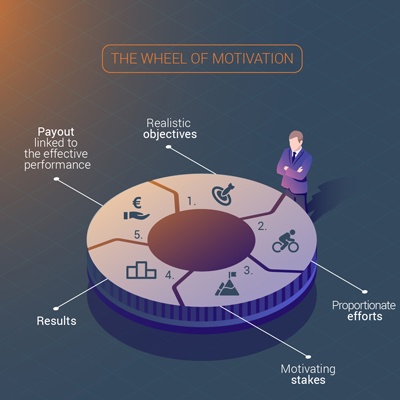The key of business management is always the motivation of sales people and their support to help them become more efficient. Crucial process for your company, commercial management is reflected and deployed with a suitable strategy.
Our tips to boost the commercial efficiency of your teams and make a difference on the field!
1. TEAM COACHING: RECOMMENDED BUSINESS MANAGEMENT METHODS
To (re) energize your team and enable them to reach the maximum of their abilities, nothing better than to set up a win-win strategy.
Authoritarian management, or at least distanced and directive, has lived. You will fully understand your hierarchical position by mastering the art of information going down (towards your team) but also ascending (towards you). This involves listening, empathy, questioning, lack of judgment, exemplarity ("I say what I do and I do what I say) and, above all, constant feedback. Your feedback will help stimulate effective behavior, discourage others or even find new ways of development.
In short, be both pedagogue, diplomat and listening to your team to coach rather than supervise!

2. SETTING UP CLEAR AND DEFINED OBJECTIVES FOR AN EFFICIENT AND MOTIVATING INCENTIVE COMPENSATION SYSTEM
Nothing better than clear and well-defined goals from the start to boost the motivation and performance of your sales people. These objectives must also be realistic so that your teams can evaluate the feasibility of the challenge you propose. Our motivational wheel describes the five essential steps your employees take to judge whether or not your incentive compensation system is motivating.
3. ORGANIZATION AND TEAM SPIRIT, YES SALES PEOPLE NEED TO HELP EACH OTHER!
Unity is strength! This makes even more sense in the era of networking and the collaborative economy. Have you ever heard of collaborative promotion?
The idea: avoid wasting time and credibility with repeated calls from your business to prospects. The tools to increase your commercial efficiency: have a CRM allowing the exchange of business information and mutual help in your team by inviting your sales representatives to ask their respective prospects if they also need the products of other salespeople. Their network of business contributors extends, your business too. All recent studies show: the best salespeople are those who know how to work in a team and who are committed to maintaining and developing their network.
4. BE DEMANDING TO MOTIVATE: THE SUPPORTS AND PROCESSES ESTABLISHED ARE THE BEST WAY
What is well conceived is clearly stated. The link between the chosen methods and the commercial strategy must clearly be highlighted among your teams as well as the motivated axes expected. Your salespeople must then be able to rely on clear, adjusted, well established supports so that they know where they are in their performance and what it brings them without leaving room for misinterpretation. A poorly understood incentive scheme is ineffective. It is necessary to allow the beneficiaries to appropriate their bonus plan, to understand the objectives, to check for themselves that the behaviors that will allow them to win are those expected by the company.
5. RECRUITMENT: PREFER A COMMERCIAL SPIRIT RATHER THAN A HIGH DEGREE!
In some European countries, having the required diploma is often the only requirement for accessing to most positions. Recruiters often need benchmarks to compare applications and to support their choices. But they also focus on detecting skills that are found only by experiencing the work in the field. Hence the success of tests and scenarios, especially to detect the famous “commercial spirit”. This this one who interests you to join you the services of a collaborator at once supportive, with active listening, who will expose the strengths of your offer.
6. MONITORING AND COACHING YOUR TEAMS: THE MANAGER MUST PROVIDE PEDAGOGY AND ADVICE TO ANALYZE THE POINTS OF IMPROVEMENT
A successful employee is an employee who has become aware of his strengths and areas for improvement. For this reason, his manager should support him, for example by clarifying the means at his disposal to achieve the defined objectives. Again, let's focus on exchange and communication.





